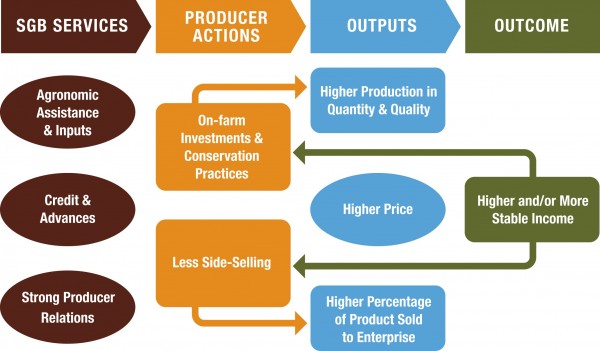
The Root Capital impact framework for how the activities of Root Capital’s clients can improve rural livelihoods.
Root Capital, the pioneering agriculture investment fund operating in some of the poorest parts of Africa and Latin America, has revised its “social and environmental scorecard” for 2015.
The scorecard is used by Root Capital loan officers to measure the social and environmental impact and goals of potential borrowers, with the premise that positive contributions in these departments are not only critical in creating sustainable livelihoods, but contribute to the bottom line.
In this way, the scorecards theoretically 1) minimize Root Capital’s risk as a lender; 2) ensure the alignment of missions between borrower and lender; and 3) provide opportunity to measure how specific social and environmental investments and programs can create financially beneficial relationships throughout the supply chain. Further, the scorecards can hypothetically be used by any number of coffee business types as an auditing tool.
It seems Root Capital is operating at a critical intersection of humanitarian-based sustainability and lending — one that has the potential to reshape supply models for the better. This is not merely mission-based lip service. It is the development of best practices beginning with investment at the farm level and extending to the operations of coffee buyers and roasters in the United States and beyond.
A goal of the scorecard is what Root Capital describes as mainstreaming. “We hope that by continuing to share our methodology and tools we can lower the barrier for other institutions looking to incorporate social and environmental indicators into their due diligence or impact measurement,” Root Capital Senior Associate for Environmental Performance Elizabeth Teague wrote in a March 3 announcement.
Root Capital cites Durham, N.C.-based green coffee importer and roaster Counter Culture Coffee as an example of this kind of mainstreaming. Under the leadership of coffee buyer and sustainability manager Kim Elena Ionescu, Counter Culture worked with Root Capital in piloting the scorecard last year with two of CC’s suppliers in the Democratic Republic of Congo and Burundi. Ionescu tells Teague:
Over the past two years, I have been thinking hard about how to broaden our understanding of environmental sustainability without weakening our sourcing standards. While I’m a passionate advocate for organic agriculture, I get frustrated when sustainability is presented as a dichotomy (good or bad, certified or not certified) instead of a continuum.
Ionescu also describes the idea of sustainability “hotspots” for any producer, furthering the concept of sustainability as a continuum:
I learned how to identify potential sustainability “hotspots” for any coffee producer, regardless of how comparatively ecologically friendly their farming practices may be. Everyone has room for improvement, and the scorecard’s questions create space for a dialogue about how to make progress in the context of the place and organization being measured, as opposed to measuring against a single, inflexible standard. Again, sustainability needs to be viewed along a continuum.
Based on its own financial analyses and case studies, Root Capital’s revised 18-page scorecard places greater emphasis on providing farmers with agronomic assistance and including women in influential enterprise roles, each of which the group believes contributes to measurably greater financial return. The scorecard also asks for more detail on producer-level business structures (i.e. private farms, cooperatives or businesses sourcing from independent farmers) in order to put financial performance in context.
Download the revised scorecard here.
Nick Brown
Nick Brown is the editor of Daily Coffee News by Roast Magazine.






Comment